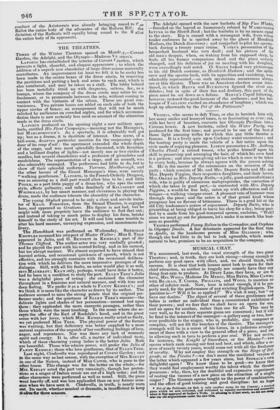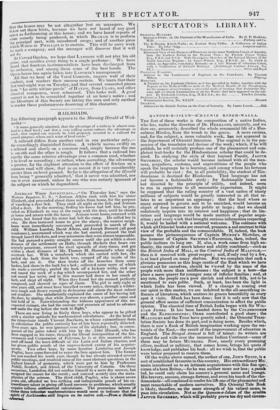MUSICAL CHAT.
WE announced, last week, the vocal strength of the two great Theatres ; and, in truth, they are both strong—strong enough to perform any good opera with effect, and, we should think, with success. It is clear that both houses must look to opera for their chief attraction, as neither in tragedy nor comedy have they any thing first-rate to produce. At Drury Lane, they have, or are to have, Mrs. W000, Madame DE MERIC, Miss BETTS, MISS CAWSE; with BR klIAM, T. COOKE, PHILLIPS, and WOOD, to mention no other of inferior rank. Now, here is talent enough, if it be pro- perly used, for the performance of any existing English opera. The question is—" Will it be so applied?" We wish it may, but " we have our doubts." The object of several of these gentlemen and ladies is rather an individual than a concentrated exhibition of their powers ; and we fear that we shall have an opera for one, and an opera for another, rather than one for all. This may be very well, as far as their separate gains are concerned; but it will be fatal to the interest of the manager—a gallery song or two, how- ever profitable to the singer, who is, probably, also composer or compiler, will not fill the benches of the theatre. The managers strength will lie in a union of his forces, in a judicious arrange- ment of them with a view to the general effect of a piece, and not in allowing each in turn to perform a pas seul. Why not revive, for instance, the Knight of Snowdoun, or the ManiacP—two operas which rank among our first and best, and which, after a re- pose of nearly twenty years, would come out with all the freshness of novelty. Why not employ this strength on the Siege of Bel- grade, or the Pirates 7—we don't mean the mutilated version of the latter which appeared a few years since, but STORACE'S own delightful opera ? We know these to be good—we know that they would find employment worthy the talent which the theatre possesses : why, then, try the doubtful and expensive experiment of resting the success of a new piece on the attraction of a single singer? The German operas taught us the power of combination, and the effect of good training and good discipline: let us hope • Pet of the Petticoats, we find, is only another name for the Convent; a musical piece which we saw, criticised, and welcomed as eqnsillse meritorious and atateestful. when it that appeared at Sadler's Wells. In alluding to it last week, we did not rte' ante our old acquaintance under the new title, that the lesson may be not altogether lost on managers. We throw out these hints, because we have not heard of any good opera as forthcoming at this house; and we have heard reports of some comedy being produced, in which BRAHAM is to perform the principal part, with introduced songs; and of another piece which WOOD or PHILLIPS is to sustain. This will be sorry work for such a company, and the manager will discover that it will not do. At Covent Garden, we hope that LAPORTE will not play his old game, and sacrifice every thing to a single performer. We have beard that fourteen instrumentalists have been discharged from his orchestra, and among them some of the best hands. The Opera-house has again fallen into LAPORTE'S management. All that we hear of the Vocal Concerts, augurs well of their conduct, and renders their success certain. We learn that their first trial-night was on Tuesday, and that several concerted pieces from "Le sette ultime parole" of HAYDN, from CLARI, and other classical composers, were rehearsed. This looks well. A good concert is not to be scrambled together at an hour's. notice ; and the Directors of this Society are taking the sure and only method to render these performances deserving of this character.



























 Previous page
Previous page